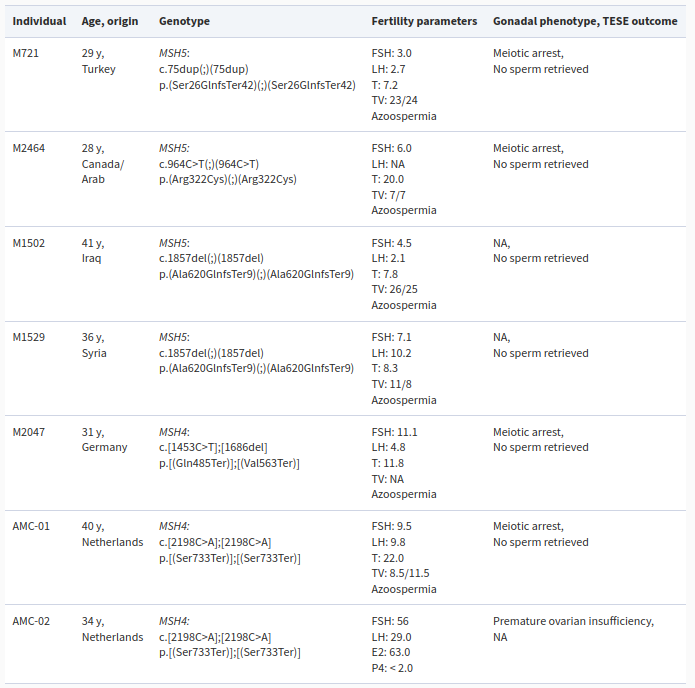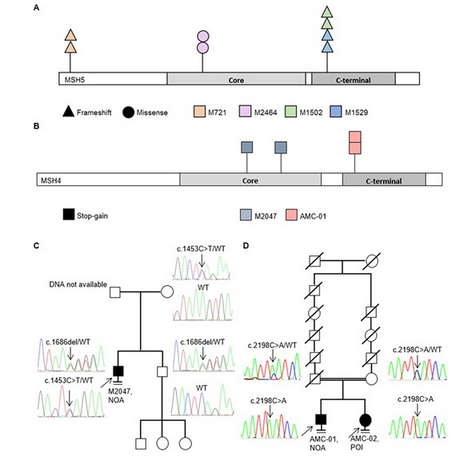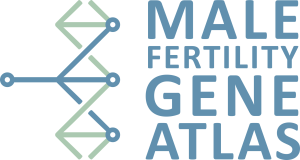Bi-allelic variants in DNA mismatch repair proteins MutS Homolog MSH4 and MSH5 cause infertility in both sexes
Wyrwoll MJ, van Walree ES, Hamer G, Rotte N, Motazacker MM, Meijers-Heijboer H, Alders M, Meißner A, Kaminsky E, Wöste M, Krallmann C, Kliesch S, Hunt TJ, Clark AT, Silber S, Stallmeyer B, Friedrich C, van Pelt AMM, Mathijssen IB, Tüttelmann F, 27.12.2021
Abstract
Study question: Do bi-allelic variants in the genes encoding the MSH4/MSH5 heterodimer cause male infertility? Summary answer: We detected biallelic, (likely) pathogenic variants in MSH5 (4 men) and MSH4 (3 men) in six azoospermic men, demonstrating that genetic variants in these genes are a relevant cause of male infertility. What is known already: MSH4 and MSH5 form a heterodimer, which is required for prophase of meiosis I. One variant in MSH5 and two variants in MSH4 have been described as causal for premature ovarian insufficiency (POI) in a total of five women, resulting in infertility. Recently, pathogenic variants in MSH4 have been reported in infertile men. So far, no pathogenic variants in MSH5 had been described in males. Study design, size, duration: We utilized exome data from 1305 men included in the Male Reproductive Genomics (MERGE) study, including 90 males with meiotic arrest (MeiA). Independently, exome sequencing was performed in a man with MeiA from a large consanguineous family. Participants/materials, setting, methods: Assuming an autosomal-recessive mode of inheritance, we screened the exome data for rare, biallelic coding variants in MSH4 and MSH5. If possible, segregation analysis in the patients' families was performed. The functional consequences of identified loss-of-function (LoF) variants in MSH5 were studied using heterologous expression of the MSH5 protein in HEK293T cells. The point of arrest during meiosis was determined by γH2AX staining. Main results and the role of chance: We report for the first time (likely) pathogenic, homozygous variants in MSH5 causing infertility in 2 out of 90 men with MeiA and overall in 4 out of 902 azoospermic men. Additionally, we detected biallelic variants in MSH4 in two men with MeiA and in the sister of one proband with POI. γH2AX staining revealed an arrest in early prophase of meiosis I in individuals with pathogenic MSH4 or MSH5 variants. Heterologous in vitro expression of the detected LoF variants in MSH5 showed that the variant p.(Ala620GlnTer9) resulted in MSH5 protein truncation and the variant p.(Ser26GlnfsTer42) resulted in a complete loss of MSH5. Large scale data: All variants have been submitted to ClinVar (SCV001468891-SCV001468896 and SCV001591030) and can also be accessed in the Male Fertility Gene Atlas (MFGA). Limitations, reasons for caution: By selecting for variants in MSH4 and MSH5, we were able to determine the cause of infertility in six men and one woman, leaving most of the examined individuals without a causal diagnosis. Wider implications of the findings: Our findings have diagnostic value by increasing the number of genes associated with non-obstructive azoospermia with high clinical validity. The analysis of such genes has prognostic consequences for assessing whether men with azoospermia would benefit from a testicular biopsy. We also provide further evidence that MeiA in men and POI in women share the same genetic causes. Study funding/competing interest(s): This study was carried out within the frame of the German Research Foundation sponsored Clinical Research Unit 'Male Germ Cells: from Genes to Function' (DFG, CRU326), and supported by institutional funding of the Research Institute Amsterdam Reproduction and Development and funds from the LucaBella Foundation. The authors declare no conflict of interest.
Wyrwoll MJ, van Walree ES, Hamer G, Rotte N, Motazacker MM, Meijers-Heijboer H, Alders M, Meißner A, Kaminsky E, Wöste M, Krallmann C, Kliesch S, Hunt TJ, Clark AT, Silber S, Stallmeyer B, Friedrich C, van Pelt AMM, Mathijssen IB, Tüttelmann F. Bi-allelic variants in DNA mismatch repair proteins MutS Homolog MSH4 and MSH5 cause infertility in both sexes. Hum Reprod. 2021 Dec 27;37(1):178-189. doi: 10.1093/humrep/deab230. PMID: 34755185.
Publication: https://doi.org/10.1093/humrep/deab230
 Disclaimer
Disclaimer
The publication Bi-allelic variants in DNA mismatch repair proteins MutS Homolog MSH4 and MSH5 cause infertility in both sexes by Wyrwoll MJ, van Walree ES, Hamer G, Rotte N, Motazacker MM, Meijers-Heijboer H, Alders M, Meißner A, Kaminsky E, Wöste M, Krallmann C, Kliesch S, Hunt TJ, Clark AT, Silber S, Stallmeyer B, Friedrich C, van Pelt AMM, Mathijssen IB, Tüttelmann F is published under an open access license: https://academic.oup.com/pages/standard-publication-reuse-rights. Journals content which is published and distributed under the Oxford University Press (OUP) Journals, Standard Publication Model is published on an exclusive licence or copyright assignment basis, and reuse rights are retained and controlled by OUP.
Curation by the MFGA team Relevant data sets presented in the publication have been identified. If possible, annotations (title, general information, conditions, processed tissue types and processed cell types) have been added based on information from the publication. Data tables and images that provide a good overview on the publication's findings on the data set have been extracted from the publication and/or supplement. If not stated otherwise, images are depicted with title and description exactly as in the publication. Tables have been adjusted to the MFGA table format. Conducted adjustments are explained in the detailed view of the tables. However, titles and descriptions have been adopted from the publication.
Data set 1: Detected biallelic variants in MSH4 and MSH5
Other: Functional Study
Species
| Species |
|---|
| Human |
Tissue Types
| BRENDA tissue ontology | Maturity | Description | Species | Replicates |
|---|---|---|---|---|
| BTO_0000553: peripheral blood | Blood circulating throughout the body. | Human |
Cell Types
| Cell ontology | Maturity | Description | Species | Replicates | Cells per replicate |
|---|---|---|---|---|---|
| CL_0000738: leukocyte | An achromatic cell of the myeloid or lymphoid lineages capable of ameboid movement, found in blood or other tissue. | Human |
Images

Table 1. Genetic and clinical data of infertile individuals carrying biallelic MSH4 and MSH5 variants detected in this study.
Licensed under: https://academic.oup.com/pages/standard-publication-reuse-rights

Figure 1. Detected biallelic variants in MSH4 and MSH5
(A) In MSH5, biallelic variants in four azoospermic individuals were identified. In individual M721, the homozygous frameshift variant c.75dup; p.(Ser26GlnfsTer42) was detected. In M2464, exome data revealed the homozygous missense variant c.964C>T; p.(Arg322Cys), while in M1502 and M1529, the homozygous frameshift variant c.1857del; p.(Ala620GlnfsTer9) was found. MSH5 protein’s structure is analogous to that of MSH4, with a core domain (DNA-binding domain) and a C-terminal domain (ATPase domain). (B) In MSH4, biallelic variants in two infertile men with MeiA were identified. In M2047, two stop-gain variants, and in AMC-01, a homozygous stop-gain variant were detected. The MSH4 protein has a core domain that functions as a DNA-binding domain and a C-terminal domain that acts as an ATPase domain. (C) Individual M2047 carried two stop-gain variants in MSH4. Compound-heterozygosity was confirmed, as his mother was heterozygous for the MSH4 variant c.1453C>T; p.(Gln485Ter) and his fertile brother was heterozygous for the MSH4 variant c.1686del; p.(Val563Ter). DNA from the proband’s father was not available. (D) Siblings AMC-01 and AMC-02 carried a homozygous stop-gain variant in MSH4. The parents, who were distantly related to each other, were both heterozygous for this variant.
Licensed under: https://academic.oup.com/pages/standard-publication-reuse-rights
Data set 2: MERGE Study
Exome: Whole Exome Sequencing
Tissue Types
| BRENDA tissue ontology | Maturity | Description | Species | Replicates |
|---|---|---|---|---|
| BTO_0000553: peripheral blood | Blood circulating throughout the body. | Human |
Data set 3: Consequences of Identified loss-of-function (LoF) variants in MSH5
Proteome: Immunohistochemistry
Tissue Types
| BRENDA tissue ontology | Maturity | Description | Species | Replicates |
|---|---|---|---|---|
| BTO_0001363: testis | A typically paired male reproductive gland that produces sperm and that in most mammals is contained within the scrotum at sexual maturity. |
